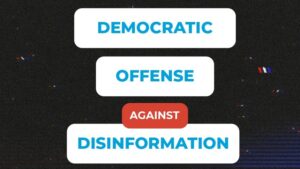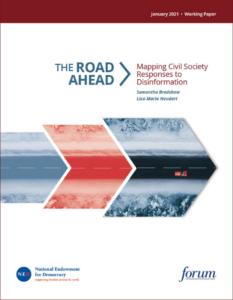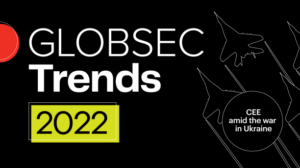
Authoritarian regimes are increasingly ignoring the sovereignty of other nations to lash out at dissent abroad or locate and punish citizens who have found refuge in another country. In what experts label “transnational repression,” governments like Turkey’s are intimidating people through online disinformation campaigns and, increasingly, by physically targeting them for violence, writes Coda Story’s Frankie Vetch.
 Post-truth is one of “The Three Ps” modern autocratic leaders use to manipulate power, alongside populism and polarization, says analyst Moises Naim. Former Mexican President Felipe Calderón discusses Populism, Polarization, and Post-Truth in Latin America with the Bush Institute’s David J. Kramer, Jessica Ludwig, and William McKenzie.
Post-truth is one of “The Three Ps” modern autocratic leaders use to manipulate power, alongside populism and polarization, says analyst Moises Naim. Former Mexican President Felipe Calderón discusses Populism, Polarization, and Post-Truth in Latin America with the Bush Institute’s David J. Kramer, Jessica Ludwig, and William McKenzie.
The global march of autocracy and democratic backsliding do demand a response, say Kerry Buck, Canada’s ambassador to NATO from 2015 to 2018, and Michael W. Manulak, assistant professor at Carleton University. They propose a Democratic Security Initiative, a cooperative forum to provide a platform for sharing best practices for the promotion and protection of democracy against emerging challenges such as disinformation.
 Three main features of this proposal are of special importance, they write in War On The Rocks:
Three main features of this proposal are of special importance, they write in War On The Rocks:
- First, who is in the club matters. Participation would be defined by openness and inclusivity. … Endorsement of a Statement of Democratic Principles setting out group objectives, for instance, could be the chief determinant of participation. The club would be more permeable to in-between countries, using networked diplomacy to build interest-based coalitions and secure commitments in those areas that matter most to global democracy and security. ….The proposed grouping would be used to build bridges, instead of erecting barriers. …. …..While such an approach would leave the door open to participation by states whose democratic credentials are currently in question, the possibility of securing commitments that these actors would in the future abide by a Statement of Democratic Principles is a gamble worth taking.
 Second, existing multilateral efforts should be reinforced. A Democratic Security Initiative would encourage states to bind themselves to established and new norms and commitments to democracy. ….Networked diplomacy around democratic commitments would serve as a docking station for collaboration in multilateral fora. ….
Second, existing multilateral efforts should be reinforced. A Democratic Security Initiative would encourage states to bind themselves to established and new norms and commitments to democracy. ….Networked diplomacy around democratic commitments would serve as a docking station for collaboration in multilateral fora. ….- Third, what the club is about matters most. Instead of being primarily defined against a subset of international actors, our proposal is calibrated for achieving specific ends. …Collaboration on economic security should be limited to what is required to reduce strategic vulnerabilities in areas that negatively impact democracy, such as energy, critical minerals, semiconductors, 5G infrastructure, elections, disinformation, or cyber.
Clearly defining the scope of this new initiative would allow for what Kevin Rudd calls “managed strategic competition” with autocratic countries such as China and Russia, Buck and Manulak contend. RTWT
The time is ripe to build democratic resilience by ensuring that technology helps protect and promote democratic institutions and values rather than undermine them, says the European Democracy Action Plan (EDAP – above).
To explore emerging challenges, obligations, and desires, the ‘Democratic Values in the Digital Age’ program collected leading experts from academia, think tanks, NGOs, policy, and the private sector. Over the course of three workshops, a variety of voices and perspectives examined some of the more prominent digital issues facing democracy, including:
 Strengthening Media Freedom and Pluralism, organized by University College Dublin – Centre for Digital Policy.
Strengthening Media Freedom and Pluralism, organized by University College Dublin – Centre for Digital Policy.
Countering Disinformation, organized by GLOBSEC, a partner of the National Endowment for Democracy (NED).
Democracy and Resilience in the Era of European Crises, oganized by the Central European Digital Media Observatory (CEDMO). RTWT







